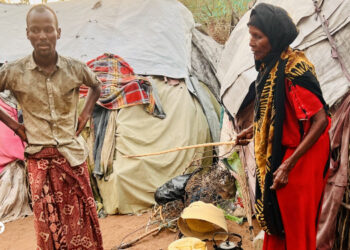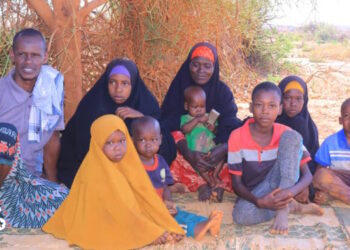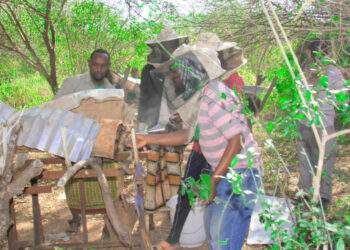(ERGO) – Villagers north of Mahaday in Somalia’s Middle Shabelle region have been cut off by river floods in September, leaving them lacking clean water, short of food, and without electricity.
The flooding caused by breaches of the River Shabelle’s banks is still spreading and has submerged homes, destroyed farmland, and cut off access to the villages.
Mahaday district commissioner, Ahmed Hussein Afrah, told Radio Ergo that the floods had affected more than 13,000 families in seven villages – Buulo Ahmed Cigoow, Mansuur, Eji, Diinlaawe, Kulmis, Obaale, and Shiile Bari.
Farmer and businessman, Yusuf Mohamed Ali, is sleeping outside with his family as their three roomed house in Mansuur is still filled with water.
“Our life has become unpredictable; sometimes we find something to eat, sometimes we don’t. We cook only once a day, and barely. The little water we had stored in jerrycans is almost finished — this is the last of it. My business has collapsed, and I have nothing else to rely on,” he said.
Yusuf’s grocery shop, which earned him between $10 and $15 a day, closed in September as the floods blocked access to nearby markets.
With no vehicles or boats able to reach Mahaday town, 18 kilometres away, Yusuf says the business he built up over 20 years is in jeopardy:
“Water has surrounded us – there’s no way in or out. My business has closed; there’s nothing to sell and no way to bring in goods. I used to restock from Mahaday or Jowhar, but now water blocks me from all four directions,” he said.
“People took food on credit from us when the floods cut off the area. Now I’m owed about $900, but no one can repay because everyone is struggling.”
His family of 16 also relied on a riverside farm that was completely flooded, just weeks before their expected harvest. Yusuf had invested $250 in seeds and labour, hoping to recover the cost after selling the crops.
“The floods have destroyed all our crops – everything we planted and everything we used to live on. I’ve lost four hectares of land where I had vegetables, maize, sesame, and other crops. Even part of my house is flooded. We are living in the water.”
The floods destroyed local wells, so residents ae drinking contaminated water. Yusuf said the only health centre in the area had been closed due to flooding.
“Anyone who falls ill cannot be taken to hospital because we can’t reach Mahaday or Jowhar, which are 18 to 20 kilometres away,” he said.
More than 500 families in Mansuur face the same situation. The village school, where five of Yusuf’s children studied for free, is closed after being flooded. The school was built four years ago through community effort.
Officials say the Shabelle River’s water level has risen sharply due to Deyr seasonal rains in Hiran and Middle Shabelle, while unmaintained river bank breakages caused the bursting of the river banks.
In neighbouring Obaale village, Maryan Nur Ali and her family of 11 have been living outdoors since early September when floods destroyed their home and farm. They lost everything and only receive occasional help from relatives in Mogadishu.
“The biggest challenge we face right now is hunger because we have nothing to eat. Our crops were destroyed and we have nothing else left. We are living in great hardship. The suffering is immense, but God has brought it,” she said.
The floods destroyed three and a half hectares of farmland they had planted with beans, maize, sesame, and okra. She had borrowed $300 to fund the planting and has no idea how to repay the debt.
Her children, the oldest aged 12, are hungry and attacked by mosquitoes outside at night.
“Everything was destroyed – houses, toilets, and belongings washed away. The place we are now living in is unfit for survival, and you can clearly see the devastation caused by the floods,” she said.
Three of her children have been suffering from fever, stomach pain, and diarrhea since 15 October, but Maryan has been unable to take them for treatment.
Four of her children, in grades two, five, and six, are out of school along with nearly 100 other pupils whose studies were halted when Obaale primary school flooded.
The head of Buulo Ahmed Cigoow village, Ahmed Ibrahim, said the floods had cut off Mansuur, Eji, Diinlaawe, Kulmis, Obaale, and Shiile Bari villages from the rest of the district.
“These people are poor farmers who depend on their muscle for daily survival. The water has taken everything they planted and everything they needed to eat. God is their only hope; they have nowhere else to turn. The dykes are broken, and we have no means to repair them. The water is too deep, and infested with reptiles and insects,” he told Radio Ergo.
He said local authorities tried to reinforce river banks with sandbags but were overwhelmed by the strength of the water current and the lack of support and machinery.
Electricity is cut off in all the affected villages. With fuel deliveries halted, only a few residents with solar panels are able to charge mobile phones. They are charging 4,000 Somali shillings per device to others.
The repeated floods across Somalia’s riverine regions have drastically reduced food production, wiped out household incomes, and left thousands of farming families struggling.










